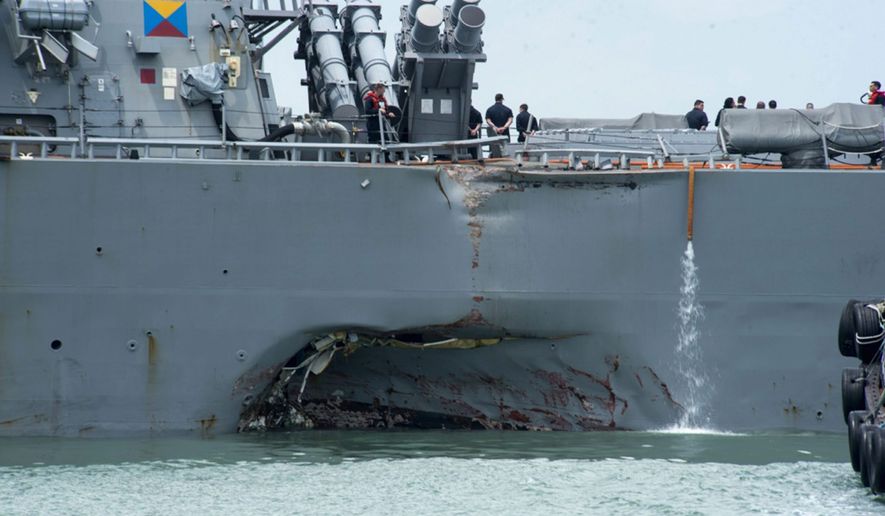Top Navy leaders are refusing to rule out the possibility that a collision between an U.S. destroyer and an oil tanker in the Pacific may have been intentional, Chief of Naval Operations Adm. John Richardson said Monday.
The incident, which occurred early Monday morning in Southeast Asian waters, resulted in 10 American sailors lost at sea and “significant damage” to the USS John S. McCain, an Arleigh Burke-class destroyer attached to the Navy’s Seventh Fleet, according to a Navy statement.
Search and rescue operations by the U.S., Indonesian, Singaporean and Malayan navies remained underway Monday night for the missing sailors, and four other U.S. sailors were reportedly evacuated from the USS McCain to medical facilities in Singapore.
The Pentagon initiated a two-day pause in all Navy operations worldwide, beginning Monday, as a result of the incident.
Adm. Richardson, who briefed reporters at the Pentagon, described the action as a “operational pause in the near term” to allow for an overall review of “the [operational] fundamentals at the unit and team level.”
He also said the sea service was initiating two major fleetwide inquiries into the incident, which is the second midsea collision in two months between American warships attached to Seventh Fleet and commercial vessels traversing international waters in the Pacific.
Earlier this month, Navy leaders fired the captain of the USS Fitzgerald and disciplined several of the ship’s senior officers after the warship collided with Philippine-flagged shipping vessel near the Japanese coast in June.
The USS McCain, named after Sen. John McCain’s father and grandfather, had been en route to Singapore after carrying out freedom of navigation operations in the hotly contested South China Sea, when it collided with the Alnic MC oil tanker on Monday.
The collision tore a 600-foot hole in the U.S. warship’s hull, flooding the ship’s machine and communications rooms as well as berthing rooms for crew, according to The Associated Press.
Adm. Richardson, meanwhile, said Monday that Navy investigators could not rule out that the incident may have been intentional. “Right now, there is no indication of that, yet,” he said. “But we are taking a look at all of that.”
He noted that Navy investigators had also explored the possibility of foul play involving the USS Fitzgerald accident, but eventually ruled it out.
Navy leaders had suspected the navigation systems aboard a pair of patrol boats operating in the Straits of Hormus last January had been compromised, leading the crews aboard those vessels to stray into Iranian waters.
That incident, which resulted in the crews being captured and briefly detained the Iranian Revolutionary Guards Corps, prompted speculation over the possibility that the navigation systems may have been hacked.
Aside from examining the chain of events leading up to Monday’s incident, the Navy has ordered all its fleet commanders to institute an immediate “fundamentals review” that will focus on the basic “blocking and tackling” duties and responsibilities required to carry out naval operations. In addition, Adm. Phillip Davidson, head of the Navy’s Fleet Forces Command, will begin his own review on how the Navy trains its junior and senior surface warfare officers, to see “how that can be improved.”
• Carlo Muñoz can be reached at cmunoz@washingtontimes.com.




Please read our comment policy before commenting.